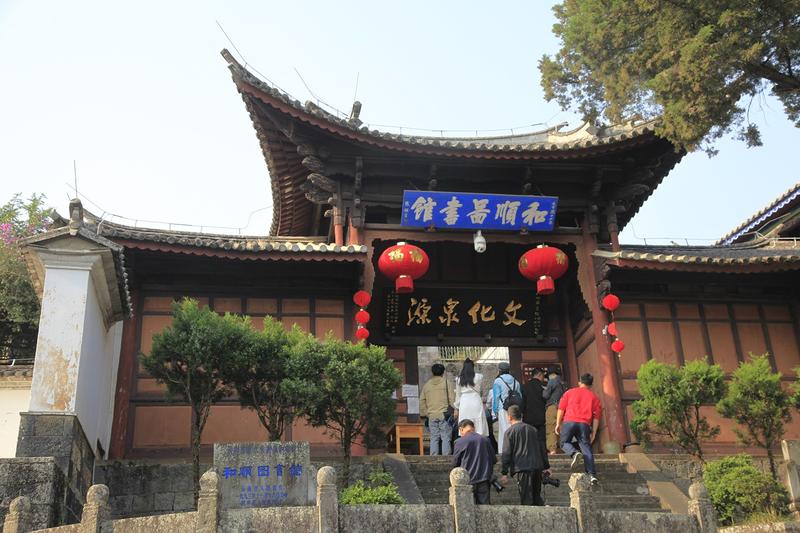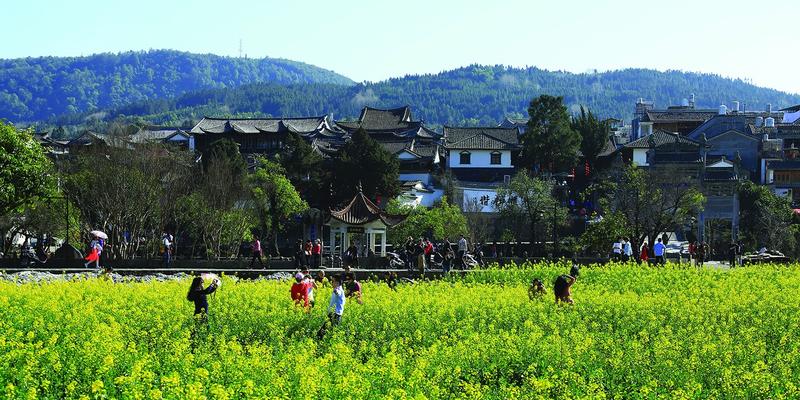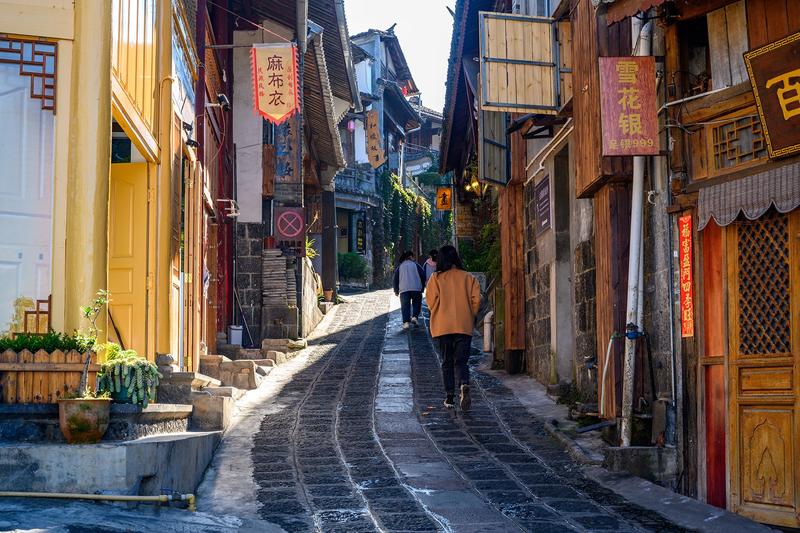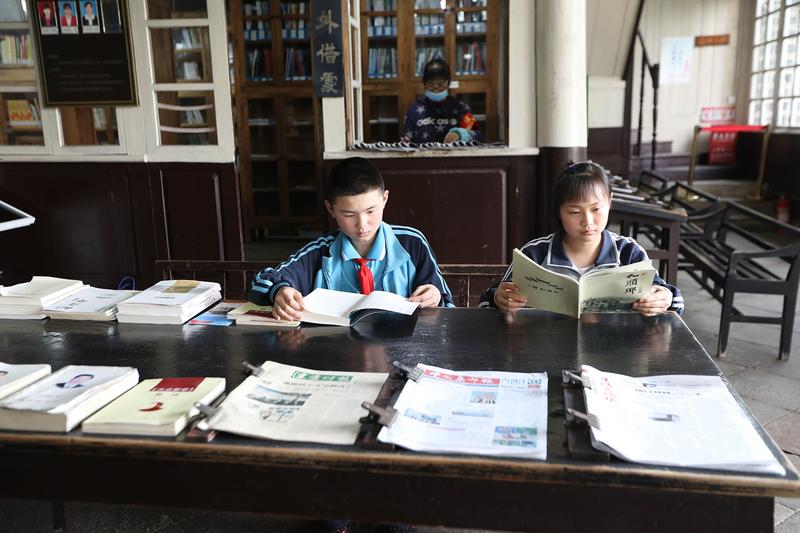President's visit reinforces the resolve of Heshun villagers to preserve traditions and face the future as they embrace a rural vitalization drive, Yang Feiyue in Beijing and Li Yingqing in Kunming report.
 Travelers visit the Heshun library. (PHOTO PROVIDED TO CHINA DAILY)
Travelers visit the Heshun library. (PHOTO PROVIDED TO CHINA DAILY)
A special guest has set Cun Maohong's determination to continue carrying on the cultural cause he has been pursuing for decades.
In January 2020, President Xi Jinping visited the old town of Heshun, Baoshan city of Southwest China's Yunnan province. Cun accompanied the president as a guide during his visit.
"It was the biggest honor of my life," Cun says.
The 67-year-old was impressed by Xi's concerns about the Heshun ancient town, a gateway to the ancient southern Silk Road that linked China's Sichuan and Yunnan provinces with Myanmar and India. During his trip, Xi learned about the historical and cultural inheritance, as well as ecological and environmental protection along the trade route.
"Through our talk, President Xi showed his care about cultural relics, ecology, history and cultural protection in the ancient town, and urged us to take good care of it," Cun says.
Cun has turned his courtyard into a homestay featuring an abundance of cultural elements for the increasing number of guests who beat a path to his door.
In particular, he has received many overseas Chinese expatriate visitors to Heshun during traditional holidays over the years, including for Spring and Qingming festivals.
Cun has arranged various cultural events for travelers to better understand Heshun.
"Heshun people have always carried on the tradition of engaging in cultural practices and have been good at it," he says.
"We have paid the most attention to cultural inheritance," he says.
 People take photos with rapeseed flowers in Heshun. (PHOTO PROVIDED TO CHINA DAILY)
People take photos with rapeseed flowers in Heshun. (PHOTO PROVIDED TO CHINA DAILY)
Cun returned to Heshun from abroad in 1982 and followed in his grandfather's footsteps to serve as the fifth curator of the Heshun library.
He has witnessed the progress in the public participation of cultural events over the past four decades.
Free calligraphy and traditional Chinese painting lessons have been held at the library, and other local cultural activities and patriotic education have been hosted for visitors to Heshun.
Since the 1920s, locals have pursued an education focusing on intellectual, ethical and athletic development. Many historical figures have emerged from the region, including Ai Siqi, a renowned philosopher.
They have helped nurture an inclusive, open and harmonious culture, which offers an inexhaustible source of power for social and economic development in Heshun, says Pu Yazeng, Party secretary of Heshun.
Local authorities have continued to tap into the area's cultural resources and to enrich the social lives of residents, especially after Xi's visit.
A philosophical seminar has been staged and representatives of local villages, officials and businesses gathered together to learn about the history of the town and exchange notes on philosophy and life.
"We've carried out themed activities on a regular basis for the residents to communicate with one another," Pu says.
The seminar was inspired by Xi, who, during his trip to Heshun, spoke about the country needing a large number of talented individuals who can competently explain the adaptation of Marxism into a Chinese context and who can use easy-to-understand language to disseminate new Party theories more widely.
 The serene and winding lanes are one of Heshun's attractions. (PHOTO PROVIDED TO CHINA DAILY)
The serene and winding lanes are one of Heshun's attractions. (PHOTO PROVIDED TO CHINA DAILY)
Guo Sheng has been giving people at the grassroots level more than 100 lectures a year about Party policy and theory.
"The key is to explain things in plain and understandable language to the public," the 59-year-old says.
Guo is one of the many lecturers in Heshun who have kept local residents abreast of the Party's guidelines and helped transform Heshun into a town with a strong philosophical understanding.
The ancient town has made great strides in tourism development, ecology preservation and cultural inheritance under the influence of the president's speech during his visit to Yunnan, Pu says.
Experiences that follow Xi's route during the visit have been developed for visitors to better understand Heshun, and, in July last year, a philosophy institute was built right next to the Ai Siqi Memorial.
"People in the neighborhood come here to read books that help them learn to improve themselves," says Li Chengyue, who has been in charge of the daily operations of the philosophy institute.
Occasionally, he also gives guided tours.
"The job is especially meaningful, because it increases the understanding of my hometown," Li says.
"All villagers have been showing an increasing sense of pride in recent years."
With a history of more than 600 years, Heshun offers natural scenery of mountains and rivers. Visitors will find exquisite courtyards, ancient inscribed tablets, serene and winding lanes, as well as down-to-earth villagers-all of which make for an idyllic pastoral getaway.
Local authorities have initiated a four-level protection mechanism that involves town and village officials, as well as civilians, for local ecology initiatives, including cultivating and nurturing local wetlands.
 Students read at the Heshun library, which was built in 1928 and has evolved into a popular spot among visitors. (PHOTO PROVIDED TO CHINA DAILY)
Students read at the Heshun library, which was built in 1928 and has evolved into a popular spot among visitors. (PHOTO PROVIDED TO CHINA DAILY)
Modern toilets have been widely installed, and trees have been planted to increase the town's forest coverage rate to 74 percent. Pollution prevention and control measures have been taken to restore local rivers and historical architecture, including ancestral halls, stone bridges and memorial gateways.
The Heshun library claims to be the biggest of its kind in the countryside. It was built in 1928 and has evolved into a popular spot among visitors.
"Our library has many inscriptions by well-known scholars and more than 100,000 books," says Wang Shanshan, an employee with the library.
The library is also home to more than 20,000 ancient thread-bound books and publications from the beginning of this century.
As public reading habits evolve, Heshun library has also rolled out various initiatives to boost public reading.
"We've relied on our in-house digital library platform to deliver free sharing of our collection, with tens of thousands of downloads every year since its inception," says the curator Cun Yu, adding the library is promoting digital literature to make reading more convenient and to upgrade public cultural services.
Walking along Wild Duck Lake, visitors can traverse a 400-meter "culture corridor" that recounts stories about the hardworking spirit and traditional nature of Heshun people and provides a glimpse into distinctive family life.
Ancestral halls are another highlight in Heshun. They have witnessed local economic, cultural and social development and appeal to overseas Chinese compatriots whose family roots lay in Heshun.
The ancient town has received 840,000 visitors since 2020, with tourism income reaching 130 million yuan ($19.4 million), according to local authorities.
"The living environment has greatly improved over the past two years," says Zhang Chengliang, an official of Heshun.
The number of homestays has tripled to 300, and about 70 restaurants and 200 shops are set up and running, Zhang says.
"Our focus is on rural vitalization and leading villagers to develop sightseeing, agriculture and tourism to boost development of Heshun," Zhang says.
For Cun Maohong, he will stay dedicated to his work, following Xi's call for protection of local cultural relics.
"Heshun people have the responsibility to protect cultural and historical sites, as well as to pass down traditional Chinese culture," Cun says.
"I'm looking forward to the president coming and visiting Heshun again."
Contact the writers at yangfeiyue@chinadaily.com.cn


